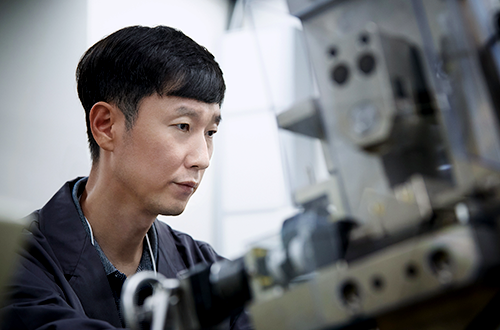Process technology jobs are critical for bridging the gap between the battery development and manufacturing stages.
The process technology center works with teams from various fields and has a large number of people with exceptional technological abilities. The center files more than 400 patent applications per year. We met with people working in process technology jobs to learn more about their jobs and to get advice for those who are interested in the position.
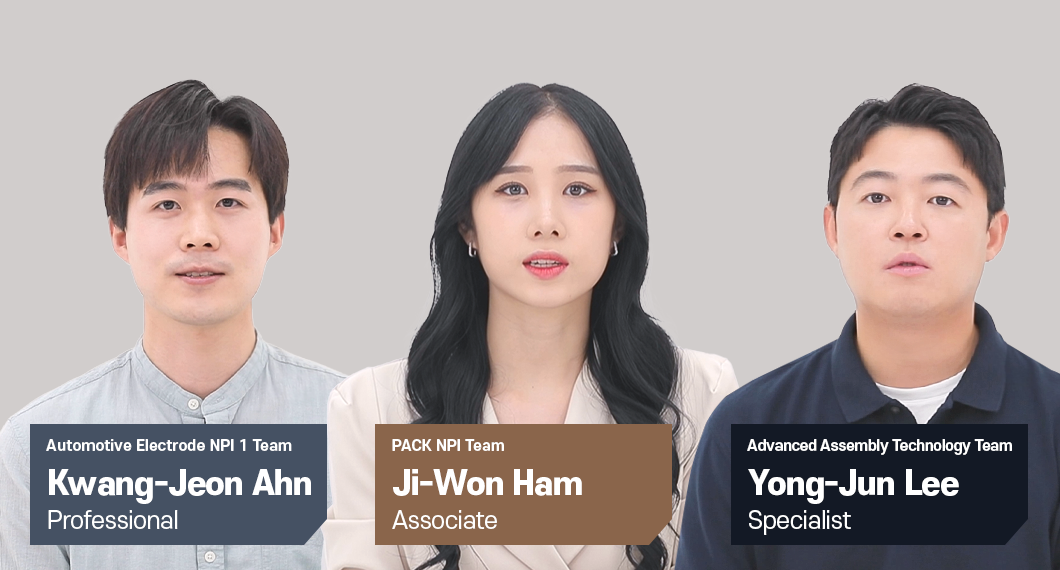
Q. Could you briefly describe your job?
(Professional Kwang-Jeon Ahn, Automotive Electrode NPI1 Team)
I am responsible for developing electrodes that meet the parameters and conditions during the manufacturing stage to enable mass production.
*Parameter: External data that affects system operation
(Associate Ji-Won Ham, PACK NPI Team)
Consider it a bridge that connects the battery module in the development model stage to the mass production stage. We develop improvement plans to help stabilize the mass production lines after verifying the design’s manufacturing processability at each development stage and identifying potential problems in advance.
(Specialist Yong-Jun Lee, Assembly Advanced Technology Team)
The anode, cathode, and separator battery material are alternately stacked on each other to form an assembly. A series of processes that join the assembly, electrolyte, and pouch is referred to as an assembly process. Our job is to identify the causes of defects during these processes, identify corrective actions, and develop technologies that can be applied to actual mass production lines.
Q. Could you tell us about your workplace?
(Professional Kwang-Jeon Ahn, Automotive Electrode NPI1 Team)
I work at a factory in Ochang in Chungcheongbuk-do province. You might expect the factory environment to be deserted, but the office was recently renovated and has numerous coffee lounges. The working environment is quite pleasant.
(Associate Ji-Won Ham, PACK NPI Team)
I also work in Ochang with Professional Ahn. You can work as if you were in a cafe with an open lounge. While taking a break, you can drink some coffee or tea.
(Specialist Yong-Jun Lee, Assembly Advanced Technology Team)
I work at R&D Campus Daejeon. People might think that those working on the processes would mainly work in factories. However, the Daejeon location seems more like a campus from the outside. Furthermore, following a recent renovation, the office is more pleasant to work in and promotes open communication.

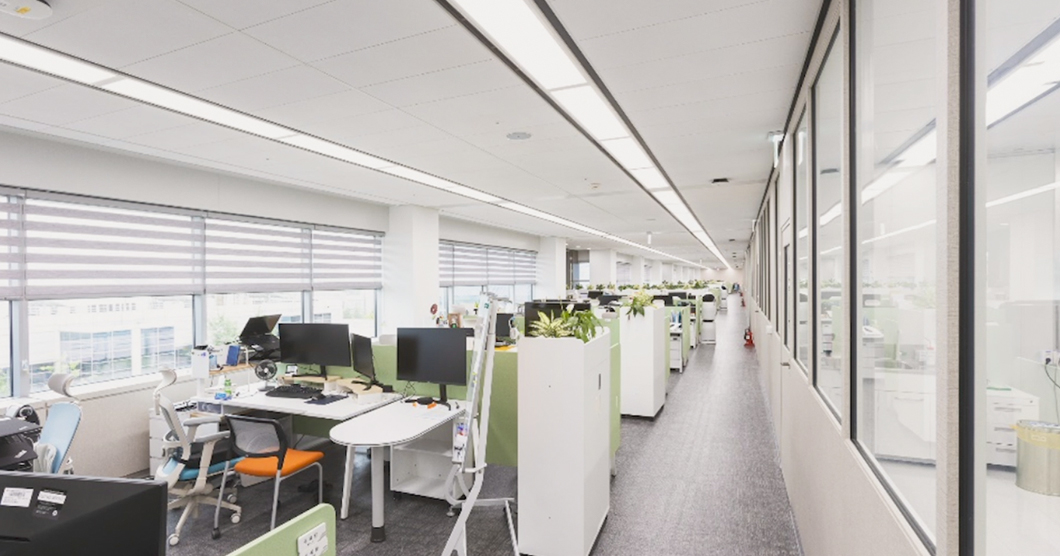
Q. What is the most significant change in your life since joining LG Energy Solution?
(Associate Ji-Won Ham, PACK NPI Team)
As for me, I had numerous opportunities to travel abroad on business. Because the majority of automobile battery production lines are located outside of Korea, I have extensive experience in foreign sites.
Q. Should someone who does not have a degree in process-related studies apply?
(Specialist Yong-Jun Lee, Assembly Advanced Technology Team)
Although the battery industry is a chemistry-based manufacturing industry, it cannot be done with people from only one background. The work necessitates the collaboration of people with diverse backgrounds, such as chemistry, machinery, electronic-electric, and computer engineering.
(Specialist Yong-Jun Lee, Assembly Advanced Technology Team)
LG Energy Solution runs a website called ‘Battery Inside.’ You will find a lot of materials that explain each process. You would benefit from studying those materials.
(Professional Kwang-Jeon Ahn, Automotive Electrode NPI1 Team)
In fact, not many new employees have extensive knowledge about batteries. For new employees, the company introduced IBT training. The company introduced IBT training for new employees. The program goes over the battery manufacturing process. As a result, if you master the program, you will have no trouble performing your duties.
*IBT(Institute of Battery Tech.): Basic and in-depth online and offline education program for engineers.
(Associate Ji-Won Ham, PACK NPI Team)
Before joining the company, I knew very little about the battery manufacturing process. However, I learned a lot of basic battery knowledge from YouTube or the company blog. So, even if you did not major in batteries, you will do well in your job if you can match your background with the process technology position.
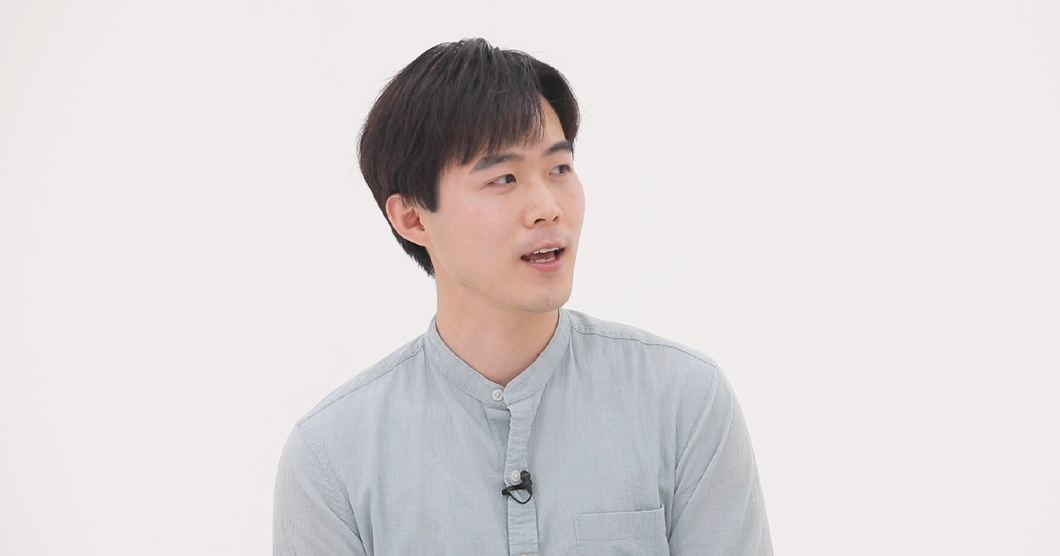
Q. Is experience with machine learning, artificial intelligence, and big data useful for process jobs?
(Professional Kwang-Jeon Ahn, Automotive Electrode NPI1 Team)
You deal with endless amounts of data than you think when working in the field. If you can use machine learning and big data or have related experience, I believe you would be able to identify causes and effects that are not readily identifiable more quickly than others.
(Associate Ji-Won Ham, PACK NPI Team)
You must have worked with data analysis tools if you have such experience. I believe you could add value by effectively identifying which processes produce the most defects and improving the defect rate, which would eventually lead to increased yield.
(Professional Kwang-Jeon Ahn, Automotive Electrode NPI1 Team)
The collected data is frequently used as a tool to detect process anomalies in advance using deep learning or machine learning, or to identify the critical factors in the process. Because the company is working to implement these technologies, if you have a similar experience, you will add significant value to your work.
Q. Could you give some examples of how DX is used in process technology tasks?
(Professional Kwang-Jeon Ahn, Automotive Electrode NPI1 Team)
Because these are crucial, the company provides numerous training programs. For example, we have big data specialist training. The company is interested in how we will use data in our work. I also participated in the training. I completed an electrode process task on identifying defect rates when products are in the assembly or pack stage and how to improve process quality.
(Associate Ji-Won Ham, PACK NPI Team)
Before implementing new technology on the actual line, a process simulation tool is also used. We can ensure the processability of the new technology by using a virtual prototype to test how the process flows and the technology risk.
(Specialist Yong-Jun Lee, Assembly Advanced Technology Team)
The collected data begins to fluctuate as the components age. As we read the changing data, we can use machine learning or deep learning to predict the lifespan of components and set the replacement cycle. We’re actually using it right now.

Q. Product specification harmonization is an integral part of process jobs. Could you explain what it is?
(Professional Kwang-Jeon Ahn, Automotive Electrode NPI1 Team)
There are finished products, such as cells or packs, and semi-finished products, such as electrodes. During the processes, their specifications link together like a spider web. Thus, specification harmonization is the process of precisely manufacturing each product. When their specifications are perfectly realized, we can ensure product quality. People will have faith in a product if specification harmonization ensures consistent quality.
* Semi-finished product: A product that is not a finished product but can be stored or sold since it has been processed.
Q. What capabilities would be required to reduce defect rates during mass production?
(Professional Kwang-Jeon Ahn, Automotive Electrode NPI1 Team)
I would say focus and observation. Overlooking something always leads to problems. I believe that putting more heart into your work will yield better results.
(Associate Ji-Won Ham, PACK NPI Team)
I believe it is necessary to be able to identify the root cause of a defect. It would be fantastic if someone could identify the root cause mentioned by Kwangjeon through observation, as this would allow us to improve fundamentally and find ways to improve.
(Specialist Yong-Jun Lee, Assembly Advanced Technology Team)
Manufacturing equipment is much faster than you think, and the processes involve complex parts and machinery. As a result, meticulous observation is required. Furthermore, asking fundamental questions such as “why is it like this?” and remaining curious are the first steps in determining the source of a problem. In other words, insatiable curiosity is required.
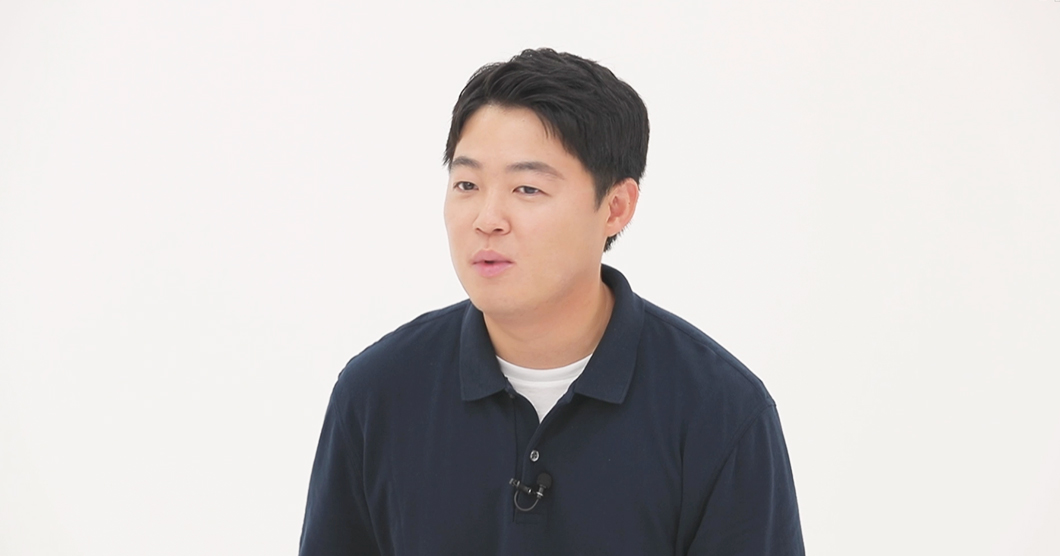
Q. Do you have any interview tips?
(Associate Ji-Won Ham, PACK NPI Team)
I wanted to express my enthusiasm for this company. So I looked up LG Energy Solution battery products on YouTube. During the interview, I talked about many of them.
(Specialist Yong-Jun Lee, Assembly Advanced Technology Team)
In addition, I convinced myself that the interviewer was unaware of my flaws. During the interview, I had “groundless confidence” that I was the best.
(Professional Kwang-Jeon Ahn, Automotive Electrode NPI1 Team)
To be honest, the interview was the most difficult part of the hiring process. I’m not good at public speaking, so I imagined the interviewers to be grown-ups or uncles I know. I tried to be as at ease as possible.
Q. What do you expect from new employees?
(Professional Kwang-Jeon Ahn, Automotive Electrode NPI1 Team)
I would say well-founded confidence. Many problems can arise at work. If you have a positive mindset that you can tackle problems and have confidence in your knowledge, you will be able to achieve good results.
(Associate Ji-Won Ham, PACK NPI Team)
If you are new, you naturally don’t know much. Also, because you’re new, I hope you’ll ask questions when you come across something you don’t understand.

Q. What is the most appealing aspect of LG Energy Solution?
(Professional Kwang-Jeon Ahn, Automotive Electrode NPI1 Team)
It is, in my opinion, a mutual respect culture. When experts from various fields work together, they may believe that they are always correct because they are the best in their field. Instead, they work together to solve problems by acknowledging, respecting, and accepting each other’s points of view. This, in my opinion, is incredible. As a result of this attitude, we can approach solutions more quickly.
(Specialist Yong-Jun Lee, Assembly Advanced Technology Team)
We have many young new employees joining the company due to our large scale recruitment. The organization’s overall atmosphere is youthful and vibrant. LG Energy Solution stands out from other industries with a strong hierarchical culture.
(Associate Ji-Won Ham, PACK NPI Team)
Its greatest strength is that it can keep up with the industry’s rapid growth. Because the battery industry is rapidly expanding, the Process Technology Center files over 400 patent applications per year.
(Professional Kwang-Jeon Ahn, Automotive Electrode NPI1 Team)
Since we are in charge of development models, the technologies applied are new. We use new technologies because we are in charge of development models. They must be protected by patents.
(Specialist Yong-Jun Lee, Assembly Advanced Technology Team)
Since we compete with other companies, patents allow us to claim ownership of the results of our efforts. That is why we keep filing patents.
Q. Do you have any final words for those considering applying for the job?
(Professional Kwang-Jeon Ahn, Automotive Electrode NPI1 Team)
Process technology jobs make many developers’ or your dreams come true. It is a good idea to research what you will be doing before applying for a job.
(Specialist Yong-Jun Lee, Assembly Advanced Technology Team)
You will have a chance if you knock on the door with a sincere attitude and youthful enthusiasm.
(Associate Ji-Won Ham, PACK NPI Team)
The fact that I did it proves that you can as well. I want you to continue with confidence.
